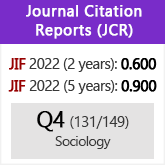Voters objecive´s and the incumbent's accountability in 1993 Spanish national elections
DOI:
https://doi.org/10.3989/ris.2005.i41.212Keywords:
Electoral Behavior, Retrospective Voting, Prospective Voting, Herestetics, AccountabilityAbstract
In this paper, it is argued that elections per se do not guarantee the accountability of governments to citizens. An argument is put forward according to which, when citizens display a negative identification with the challenger, governments may avoid to be accountable to citizens by means of herestitical maneuvers. In order to illustrate the argument, an especially relevant test case is analyzed: the 1993 Spanish National Elections. More specifically, the empirical analysis consists of the study of the electoral behavior of a group of voters who, in spite of their negative evaluation of the government performance, and however their initial declared voting intention, they finally voted for the party in office. The empirical results show how the government avoided to be accountable by means of herestetical maneuvers.
Downloads
Download data is not yet available.
Downloads
Published
2005-08-30
How to Cite
Morillas Martínez, J. R. (2005). Voters objecive´s and the incumbent’s accountability in 1993 Spanish national elections. Revista Internacional De Sociología, 63(41), 37–68. https://doi.org/10.3989/ris.2005.i41.212
Issue
Section
Articles
License
Copyright (c) 2005 Consejo Superior de Investigaciones Científicas (CSIC)

This work is licensed under a Creative Commons Attribution 4.0 International License.
© CSIC. Manuscripts published in both the printed and online versions of this Journal are the property of Consejo Superior de Investigaciones Científicas, and quoting this source is a requirement for any partial or full reproduction.All contents of this electronic edition, except where otherwise noted, are distributed under a “Creative Commons Attribution 4.0 International” (CC BY 4.0) License. You may read here the basic information and the legal text of the license. The indication of the CC BY 4.0 License must be expressly stated in this way when necessary.
Self-archiving in repositories, personal webpages or similar, of any version other than the published by the Editor, is not allowed.

















